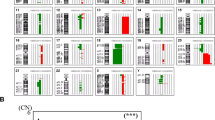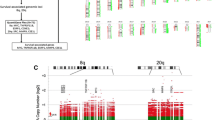Abstract
Colorectal cancer is a leading cause of cancer deaths worldwide. Genetic markers involved in prognosis of colorectal cancer are still being elucidated. In this study, genetic alterations associated with prognosis of colorectal cancer were determined using arbitrarily primed polymerase chain reaction (AP-PCR) and analyzed quantitatively by real-time PCR. Seven different DNA sequences, mapped on chromosomes 13q31.1, 9q31.1, 1q24, 4q31.3, 10q21, 11q13.4, and 13q13.3, were identified. Among these sequences, seven cases (23%) harbored DNA amplification in chromosome 13q31.1, and 9 (29%) and 7 (23%) presented genetic alterations in chromosome 1q24 and 11q13.4, respectively. Multivariate analysis showed that only DNA amplification in chromosome 13q31.1 was associated with poor survival among patients with colorectal cancer, with median survival time for chromosome 13q31.1 amplification versus no amplification of 64 versus 268 weeks (P = 0.001). This genetic alteration may have a prognostic role in colorectal cancer.



Similar content being viewed by others
References
Parkin DM, Bray F, Ferlay J, Pisani P (2005) (2002) Global cancer statistics, CA cancer. J Clin 55:74–108
Srisukho S, Srivatanakul P, Sumitsawan Y (2007) Colon and rectum. In: Khuhaprema T et al (eds) Cancer in Thailand vol IV, 1998–2000. Bangkok Medical Publisher, Bangkok, pp 34–35
Ilyas M, Straub J, Tomlinson IPM, Bodmer WF (1999) Genetic pathways in colorectal and other cancers. Eur J Cancer 35:1986–2002
Baker SJ, Preisinger AC, Jessup JM et al (1990) p53 Mutations occur in combination with 17p allelic deletions as late events in colorectal tumorigenesis. Cancer Res 50:7717–7722
Galiatsatos P, Foulkes WD (2006) Familial adenomatous polyposis. Am J Gastroenterol 101:385–398
Chung DC (2000) The genetic basis of colorectal cancer: insights into critical pathways of tumorigenesis. Gastroenterol 119:854–865
Chaksangchaichot P, Punyarit P, Petmitr S (2007) Novel hMSH2, hMSH6 and hMLH1 gene mutations and microsatellite instability in sporadic colorectal cancer. J Cancer Res Clin Oncol 133:65–70
Micthell RJ, Farrington SM, Dunlop MG, Campbell H (2002) Mismatch repair genes hMLH1 and hMSH2 and colorectal cancer: a HuGE review. Am J Epidemiol 156:885–902
Welsh J, McClelland M (1990) Fingerprinting genomes using PCR with arbitrary primers. Nucleic Acids Res 18:7213–7218
Williams JG, Kubelik AR, Livak KJ, Rafalski JA, Tingey SV (1990) DNA polymorphisms amplified by arbitrary primers are useful as genetic markers. Nucleic Acids Res 18:6531–6535
Navarro JM, Jorcano JL (1999) The use of arbitrarily primed polymerase chain reaction in cancer research. Electrophoresis 20:283–290
Rosai J (1996) Ackerman’s surgical pathology, 8th edn, vol II, Mosby Year Book Inc. USA
Miller SA, Dykes DD, Polesky HF (1988) A simple salting out procedure for extracting DNA from human nucleated cells. Nucleic Acids Res 16:1215
Sealee P, Wongkham S, Bhudhisawasdi V, Sripa B, Chariyalertsak S, Petmitr S (2008) Loss on chromosome 5q34 is associated with poor prognosis in hepatocellular carcinoma. J Cancer Res Clin Oncol 134:1135–1141
Livak KJ, Schmittgen TD (2001) Analysis of relative gene expression data using real- time quantitative PCR and the 2(Delta Delta C(T)) method. Methods 25:402–408
Jass JR (2006) Colorectal cancer: a multipathway diseases. Crit Rev Oncog 12:273–287
Kallioniemi A, Kallioniemi OP, Sudar D et al (1992) Comparative genomic hybridization for molecular cytogenetic analysis in solid tumors. Science 258:818–821
Oga A, Kawauchi S, Izumi H, Ping LX, Furuya T, Susuki K (2002) New perspectives for tumor pathology provided by comparative genomic hybridization. In J Clin Oncol 7:133–137
Liu XP, Kawauchi S, Oga A, Sato T, Ikemoto K, Ikeda E, Sasaki K (2007) Chromosomal aberrations detected by comparative chromosomal hybridization predict outcome in patients with colorectal carcinoma. Oncol Rep 17:261–267
de Juan C, Iniesta P, Vega FJ et al (1998) Prognostic value of genomic damage in non-small-cell lung cancer. Br J Cancer 77:1971–1977
Maeda T, Jikko A, Hiranuma H, Fuchihata H (1999) Analysis of genome instability in squamous cell carcinoma of the head and neck using the random amplified polymorphic DNA method. Cancer Lett 138:183–188
Chuensumran U, Wongkham S, Pairojkul C, Chauin S, Petmitr S (2007) Prognostic value of DNA alterations on chromosome 17p13.2 for intrahepatic cholangiocarcinoma. World J Gastroenterol 13:2986–2991
Lin Y-W, Sheu J-C, Chen C-H et al (1999) Loss of heterozygosity at chromosome 13q in hepatocellular carcinoma: identification of three independent regions. Eur J Cancer 35:1730–1734
Sabbir MG, Roy A, Mandal S, Dam A, Roychoudhury S, Panda CK (2006) Deletion mapping of chromosome 13q in head and neck squamous cell carcinoma in Indian patients: correlation with prognosis of the tumour. Int J Exp Path 87:151–161
Gordon AT, Brinkschmidt C, Anderson J et al (2000) A novel and consistent amplicon at 13q31 associated with alveolar rhabdomyosarcoma. Genes Chromosomes Cancer 28:220–226
Schmidt H, Bartel F, Kappler M et al (2005) Gains of 13q are correlated with a poor prognosis in liposarcoma. Mod Pathol 18:638–644
Yu W, Inoue J, Imoto I, Matsuo Y, Karpas A, Inazawa J (2003) GPC5 is a possible target for the 13q31–32 amplification detected in lymphoma cell line. J Hum Genet 48:331–335
Ota A, Tagawa H, Karnan S, Tsuzuki S, Karpas A, Kira S, Yoshida Y, Seto M (2004) Identification and characterization of a novel gene, C13orf25, as a target for 13q31–32 amplification in malignant lymphoma. Cancer Res 64:3087–3095
Acknowledgments
This research project was supported by Mahidol University. The authors thank Professor Prapon Wilairat, Department of Biochemistry, Faculty of Science, and Mr. Paul Adams, Faculty of Tropical Medicine, Mahidol University for correcting the manuscript.
Conflict of interest
None.
Author information
Authors and Affiliations
Corresponding author
Rights and permissions
About this article
Cite this article
Sareeboot, T., Punyarit, P. & Petmitr, S. DNA amplification on chromosome 13q31.1 correlated with poor prognosis in colorectal cancer. Clin Exp Med 11, 97–103 (2011). https://doi.org/10.1007/s10238-010-0107-4
Received:
Accepted:
Published:
Issue Date:
DOI: https://doi.org/10.1007/s10238-010-0107-4




